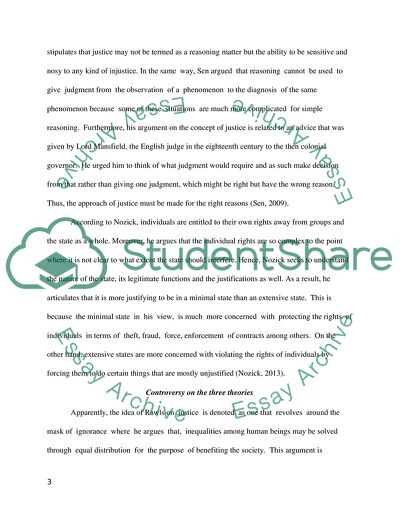
- Home
- Free Samples
- Premium Essays
- Editing Services
- Extra Tools
- Essay Writing Help
- About Us
- Studentshare
- Subjects
- Law
- Critical Legal Thinking, Sens Basic Principles
Critical Legal Thinking, Sens Basic Principles - Essay Example

- Subject: Law
- Type: Essay
- Level: Undergraduate
- Pages: 22 (5500 words)
- Downloads: 0
- Author: elmokunde
Extract of sample "Critical Legal Thinking, Sens Basic Principles"
Rawls says that his main aim in analyzing and working on the theory of justice is to generate a practicable alternative that is capable of bringing to an end the doctrines that have dominated philosophical tradition. As such, he argues that justice is the primary virtue of social institutions because truth emanates from the thinking systems. Additionally, theories that are not true within institutions and laws must be abolished irrespective of how elegant and economical they may seem to appear in any society. Therefore, the concept of justice should be based on a just society where the liberties of equal citizenship are fully developed; the rights emanating from justice are not put under political bargaining or the calculus of social interests.
In a general sense, he argues that society can only accept working with an erroneous theory for lack of a better one and to avoid greater injustices (Rawls, 2009). On the other hand, Sen begins his book by giving a scenario of a reaction that was given by philosopher, Burke after the storming of the Bastille in Paris. The issue of justice had come up, but it was difficult to approach it. In this regard, he articulates that the most important issue on the approach to justice revolves around agreeing on how best a dominant reason that is meant for diagnosing justice could be reached.
As such, he gives more current events that are intended to increase the analysis of the approach to justice. Additionally, the theory of justice has many relations to engagement reasoning about the general discipline. Another version of justice stipulates that justice may not be termed as a reasoning matter but as the ability to be sensitive and nosy to any kind of injustice. In the same way, Sen argued that reasoning cannot be used to give judgment from the observation of a phenomenon to the diagnosis of the same phenomenon because some of these situations are much more complicated than simple reasoning.
Furthermore, his argument on the concept of justice is related to advise that was given by Lord Mansfield, the English judge in the eighteenth century to the then-colonial governor.
...Download file to see next pages Read MoreCHECK THESE SAMPLES OF Critical Legal Thinking, Sens Basic Principles
Clinical Supervision Reflection and Action Plan
Principles of Criminal Liability
Abstraction and Practicality in Legal Philosophy
The CANADA: Fundamental Rights
Civil and Criminal Legislation for Legal Entities
Criminal Liability Theory and Principles
Criminal and Civil Litigation; Mental Health Law
Basic Principles of Humanitarian Law

- TERMS & CONDITIONS
- PRIVACY POLICY
- COOKIES POLICY